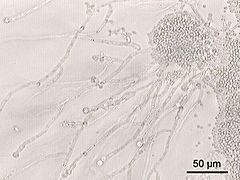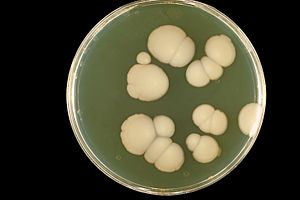Candida facts for kids
Quick facts for kids Candida |
|
|---|---|
 |
|
| Candida albicans at 200X magnification | |
| Scientific classification | |
| Kingdom: | |
| Division: | |
| Class: |
Saccharomycetes
|
| Order: |
Saccharomycetales
|
| Family: |
Saccharomycetaceae
|
| Genus: |
Candida
Berkh. (1923)
|
| Type species | |
| Candida vulgaris Berkh. (1923)
|
|
Candida is a group of tiny living things called yeasts. Yeasts are a type of fungus, like mushrooms, but much smaller. These fungi are a very common cause of fungus infections around the world. Many people have Candida on their skin or inside their bodies without getting sick. But if someone is already weak from another illness, Candida can cause problems.
The most common type is Candida albicans. When this fungus causes an infection, it's called candidiasis or thrush. Other types of Candida can live in your gut.
It's important to know that regular medicines called antibiotics, which fight bacteria, do not work against yeast infections. In fact, antibiotics can sometimes make a Candida infection worse.
Where Does Candida Live?
This fungus can be grown in a lab for study. Candida looks like large, round, white, or cream-colored circles. They can even smell a bit like bread!
Candida can be found on almost all healthy skin. Dry skin usually has less of this fungus. Small amounts of Candida are also found in other parts of the body. These include the nose, throat, lungs, and the digestive system. This is completely normal and usually doesn't cause any issues.
Treating Candida Infections
For people who are otherwise healthy, a Candida infection can often be cured easily. This might involve using a skin ointment or taking medicine by mouth. Many skin medications for Candida can be bought without a doctor's prescription.
However, for people who are already sick or have a weakened immune system, candidiasis can become a very serious illness. It can cause problems like painful sores or swelling. It can also lead to infections in the heart, eyes, or other organs. Candida can enter the body through cuts in the skin. In rare cases, it can even cause a blood infection.
 | Chris Smalls |
 | Fred Hampton |
 | Ralph Abernathy |


